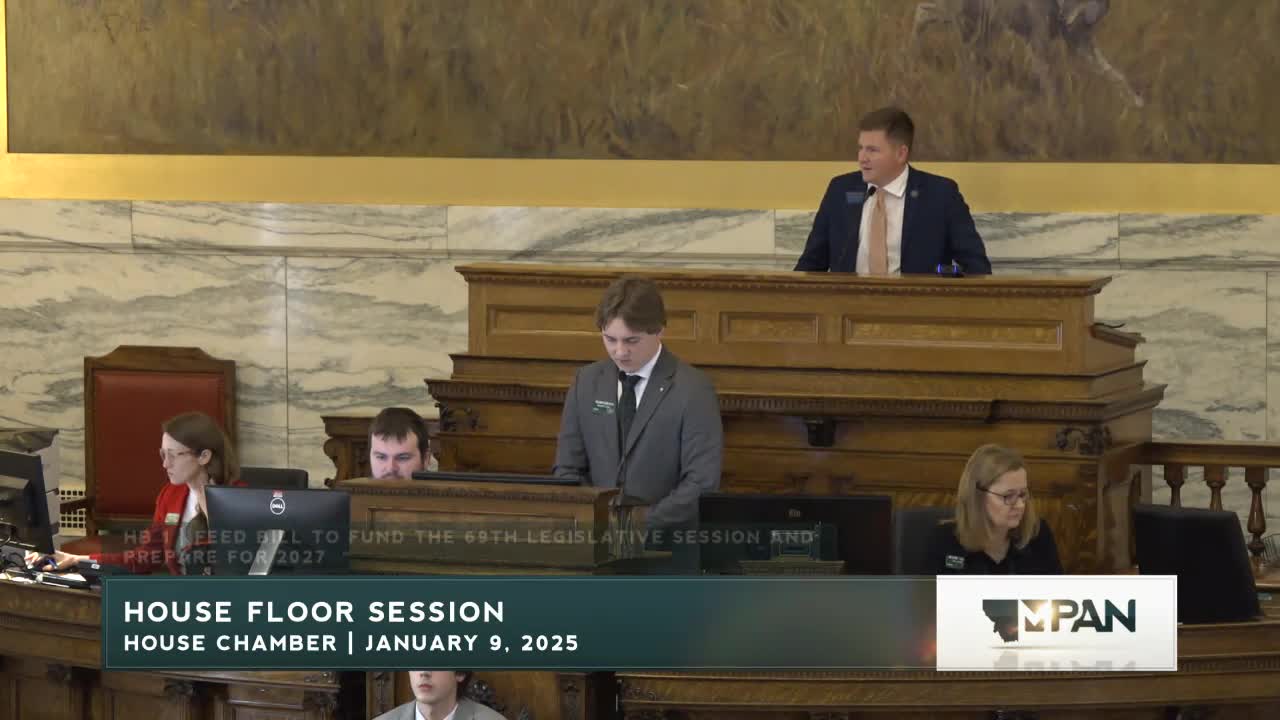House approves operating "feed" bill including legal-defense appropriation after amendment fails
Get AI-powered insights, summaries, and transcripts
Subscribe
Summary
The Montana House voted to advance House Bill 1, the Legislature's operating "feed" bill, after rejecting an amendment that would have removed a line-item to cover legal defense costs tied to a court order dispute over legislative "junk files."
HELENA ' The Montana House of Representatives voted Friday to advance House Bill 1, the Legislature's operating appropriation known as the "feed" bill, after rejecting an amendment that would have removed a legal-defense appropriation tied to a court dispute over legislative privilege.
House Bill 1, introduced by Representative Jones, funds the day-to-day operations of the legislature, including member salaries, per diem, staff pay, audiovisual and printing costs and startup expenses for the next session. Representative Jones described the measure as "the feed bill" and said it covers the remaining days of this session and the start of the next.
The bill drew focused debate over a line item to pay legal-defense costs arising from a court order and a subsequent lawsuit about whether certain legislative communications are privileged. Representative Cafaro moved amendment 001.001.002 to remove what Cafaro described as a roughly $125,000 appropriation that would be used to defend a policy change on withholding internal drafting materials known in remarks as "junk files." Cafaro said: "This money could and should be spent on the priorities we were sent here to focus on, schools, infrastructure, health care, law enforcement."
Representative Jones and other supporters said the Legislative Services Division and staff must have funds to defend actions taken in response to a court order. Jones said the division was "forced to act" after a 30-page district court order and that the division has been named in litigation; he described the appropriation as money needed to defend staff responding to the court process.
Opponents framed the dispute as a transparency issue. Representative France said the body should err on the side of public access: "Our business is the public's business, our business is the people's business, and what we do here is open and available to them." Representative Nave argued the amendment could be impractical if applied to every internal communication: "If the minutiae of what goes on between a legislator and a bill drafter ... needs to be available to the public, then it's gonna cost more than a $125,000 to wire this whole building," Nave said.
The amendment failed on a recorded vote, 41 in favor and 59 opposed. After debate closed, the Committee of the Whole recommended House Bill 1 "do pass," and the House recorded a second-reading tally of 95 yeas and 5 nays. The bill therefore advanced to further floor action.
The contested appropriation was described at different points in remarks as $125,000 (Representative Cafaro) and as $150,000 (Representative Jones's initial summary). The bill sponsor and supporters emphasized that much of HB1 reflects negotiated and ongoing expenses the legislature must fund to continue operations.
Committee leaders said the bill also includes start-up costs for the next session and amounts for legislative services. Jones summarized the bill's major components as operational funding for the House and Senate and an appropriation for legal defense tied to litigation over the privilege determination.
No formal directive to change the legal-defense language was adopted; the amendment to remove the appropriation failed and the bill advanced. The Committee of the Whole report adopting the recommendation was later adopted by the House and HB1 moved forward to the next steps in the legislative process.
